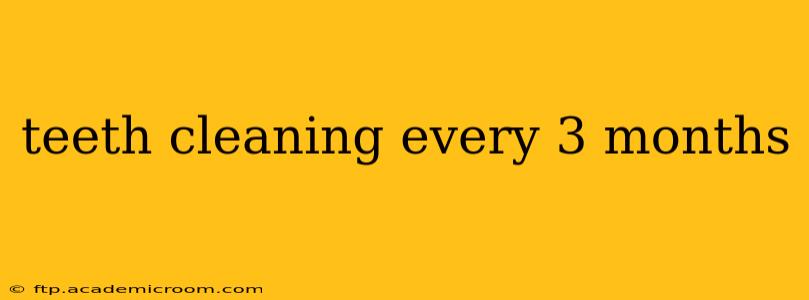Maintaining optimal oral health is crucial for a lifetime of healthy smiles. While the recommended frequency of professional teeth cleanings is often debated, understanding the nuances of your individual needs is key. This comprehensive guide explores the benefits and considerations surrounding getting your teeth cleaned every three months.
How Often Should I Get My Teeth Cleaned?
The standard recommendation from dentists is to schedule professional teeth cleanings every six months. However, this is a general guideline. The ideal frequency depends on several factors, including your individual oral hygiene habits, susceptibility to gum disease, and overall health. Some individuals may benefit from more frequent cleanings, while others might find six-monthly visits sufficient.
What Are the Benefits of Getting My Teeth Cleaned Every 3 Months?
More frequent cleanings, like every three months, offer several advantages for certain individuals:
-
Early Detection of Problems: Regular checkups allow dentists to identify potential issues, such as cavities or gum disease, at their earliest stages when treatment is often simpler and less invasive. This proactive approach significantly contributes to long-term oral health.
-
Improved Gum Health: For those prone to gum disease (gingivitis or periodontitis), more frequent cleanings can significantly reduce inflammation and prevent further progression. Professional cleanings remove plaque and tartar buildup that your toothbrush and floss may miss, preventing gum irritation and infection.
-
Whiter Teeth: While not the primary purpose, professional cleanings can remove surface stains, resulting in brighter teeth. This is especially beneficial for those who consume staining substances like coffee, tea, or red wine.
-
Reduced Risk of Tooth Loss: By addressing potential problems early and maintaining excellent oral hygiene, frequent cleanings contribute to preserving your natural teeth for a longer period.
Is Getting My Teeth Cleaned Every 3 Months Too Often?
For many individuals, cleaning every three months might be unnecessary and potentially excessive. Overly frequent cleanings might not offer significant additional benefits and could lead to unnecessary expenses. This is especially true for individuals with excellent oral hygiene habits and a low risk of gum disease.
What Factors Determine How Often I Need a Cleaning?
Several factors influence the recommended frequency of professional teeth cleanings:
-
Oral Hygiene Habits: Individuals who diligently brush and floss twice daily and use mouthwash may require less frequent professional cleanings.
-
Genetic Predisposition: Some individuals are genetically predisposed to gum disease, requiring more frequent monitoring and cleanings.
-
Dietary Habits: A diet high in sugar and processed foods increases the risk of cavities and requires more frequent professional attention.
-
Smoking: Smoking significantly increases the risk of gum disease and oral cancers, necessitating more frequent checkups and cleanings.
-
Existing Oral Health Conditions: Individuals with existing conditions like gum disease or diabetes might require more frequent professional cleanings.
How Much Does a Teeth Cleaning Cost Every 3 Months?
The cost of professional teeth cleanings varies depending on location, dentist, and insurance coverage. It's essential to discuss costs with your dentist before scheduling appointments to avoid unexpected expenses.
Should I Get My Teeth Cleaned Every 3 Months if I Have Gum Disease?
If you have been diagnosed with gum disease (gingivitis or periodontitis), your dentist will likely recommend more frequent cleanings, potentially every three months or even more often. This is crucial for managing the disease and preventing further damage. Your dentist will tailor the frequency to your specific needs and the severity of your gum disease.
In conclusion, while the standard recommendation is every six months, the ideal frequency of professional teeth cleanings is personalized. Discuss your individual needs and risk factors with your dentist to determine the best schedule for maintaining optimal oral health. Remember, preventative care is key to a lifetime of healthy smiles.
